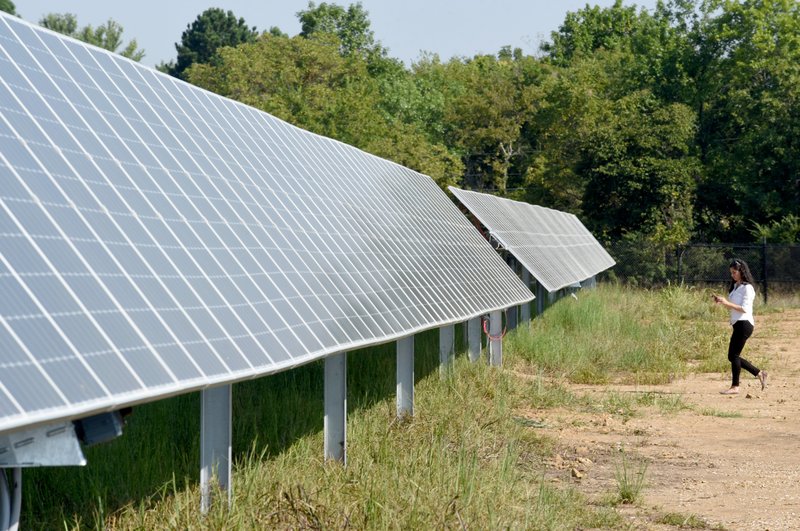HOT SPRINGS -- Generating renewable energy for the electrical grid is expected to offset most or all of the city's electrical costs, according to a solar-power developer with which the Hot Springs Board of Directors entered into an energy-services agreement last week.
The city will pay Scenic Hill Solar of North Little Rock 5.90 cents per kilowatt hour generated by solar arrays the company will install, own, operate and maintain on Hot Springs property. That power will go onto the grid, giving the city a credit for every kilowatt hour added to Entergy Arkansas Inc.'s distribution system.
Scenic Hill Chief Executive Officer Bill Halter said Sept. 18 that the city pays Entergy 8.88 cents per kilowatt hour on average. Paying Scenic Hill two-thirds of that cost to generate power that offsets the city's electrical costs will save $200,000 next year and more than $30 million over the 28-year term of the agreement, the city and company said.
Scenic Hill's rate increases 1% annually, reaching 9.97 cents per kilowatt hour in the final year. The agreement includes an option for a two-year extension at the end of the term. The city gave the solar developer's statement of qualifications the highest rank of the eight companies that responded to the request for qualifications the city issued in January.
"We think this is a good agreement," City Manager Bill Burrough told the board Tuesday. "We foresee this saving the city millions of dollars over the next 28 years."
A news release the city issued Wednesday said the 12.75-megawatt DC solar plant that Scenic Hill will build across five city-owned properties will be the state's largest solar municipal project. Arrays will be built at the Ouachita Water Treatment Plant, the upper Lake Hamilton facility that provides most of the city's treated water, and the new plant the city is about to build off Amity Road.
The Regional Wastewater Treatment Plant on Davidson Drive, Southwest Wastewater Treatment Plant on Winkler Road and Kimery Park also will host arrays. The 32,692 modules are expected to generate renewable energy equal to the city's almost 20 million kilowatt-hour annual consumption, which the city said costs about $2 million a year.
Scenic Hill said the 540 million kilowatt hours in renewable energy the city will add to the grid over the next 30 years could power thousands of homes for a year and reduce carbon dioxide emissions by 380,000 metric tons.
Halter said legislation the General Assembly adopted earlier this year allowed local governments to indirectly benefit from the 30% federal solar investment tax credit, letting them subsidize energy costs through net metering arrangements with solar power developers such as Scenic Hill. Government entities could not be net metering customers prior to the new law.
Scenic Hill will apply the 30% credit to its capital investment in the solar project. Halter said the credit drops to 26% next year, 22% in 2021 and eventually to 10%. Entering into an agreement before the end of the year allowed Scenic Hill to lock in the 30% credit.
"The way that benefits you is we're passing that through in the form of a lower electricity price from these power plants," Halter, formerly the state's lieutenant governor and the deputy commissioner of the Social Security Administration, told the board earlier this month. "If we step down from 30% to 26, it makes it more difficult for us to pass along savings. Now is the optimal time to make this move, particularly because the city is not going to be out any capital."
The agreement includes an option to buy the solar plant from Scenic Hill after six years for $15.9 million or fair market value, whichever is greater.
"If you bought the power plant, after all costs, debt, interest payments, operating costs, insurance, everything, all in, you would save $40 million over the life of the plant," Halter told the board.
The board also granted Scenic Hill a 40-year lease for its solar facilities. Halter said Scenic Hill has to negotiate an interconnection agreement with Entergy and get it approved by the Public Service Commission before the project can be built. Construction is expected to take six months once all approvals are in place, he said.
Scenic Hill's other projects include the 6.5-megawatt solar array it built for Clarksville's electric and water utility in 2017, Arkwest Communications Inc.'s 450-kilowatt solar plant in Danville, and a 1.2 MW solar array for L'Oreal USA's North Little Rock location.
Metro on 09/25/2019
